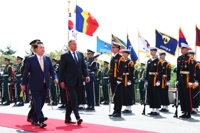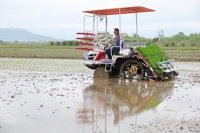U.S. calls for enhancing defense against 'very real' biological weapons threats from N. Korea
By Chang Jae-soon
WASHINGTON, July 31 (Yonhap) -- The U.S. shipment of live anthrax spores to South Korea was an "extremely regrettable" mistake that happened as the allies sought to enhance capabilities to cope with "very real and significant" biological weapons threats, a Pentagon official said Friday.
"While this was an extremely regrettable incident, it is important to keep in mind that our alliance biological defense programs are designed to enhance U.S. and ROK readiness and defensive capabilities in the face of very real and significant biological weapons threats," said Capt. Jeff A. Davis, a Pentagon spokesman.
"We look forward to continuing to work with the Republic of Korea, and all of our allies and partners," he said.
The officer was apparently referring to North Korea's biological warfare capabilities. According to South Korea's defense "white paper," the North is believed to be capable of cultivating various types of biological agents, such as anthrax, and producing them into biological weapons.
In late May, the Pentagon announced that a Department of Defense lab in Utah sent live anthrax samples to laboratories in nine U.S. states as well as an American military base in South Korea. Further mistaken shipments have since been revealed, bringing the total to 86 labs in 20 states, Washington, D.C., and seven foreign countries.
The bacteria should have been made inactive before shipments.
U.S. Forces Korea (USFK) said at the time that the sample delivered to Osan Air Base in Pyeongtaek, south of Seoul, was destroyed when it was suspected of being live, but 22 civilian and military personnel "may have been exposed" and were given emergency treatment, though none of them showed any signs of exposure.
It said the sample was brought in for a training exercise aimed at testing field equipment and new systems designed to identify toxins and pathogens.
The U.S. and South Korea have also launched a joint task force to look into the incident. Last week, the Pentagon announced the outcome of its month-long investigation into the case, blaming "deficiencies" in protocols for killing anthrax spores for the erroneous shipments.
"The US and ROK established an Alliance Joint Working group on U.S.-ROK Biological Defense Cooperation, which is reviewing the incident at Osan Air Base. The joint working group will incorporate information from the DoD Comprehensive Review," Davis said.
jschang@yna.co.kr
(END)
-
 Overdue debut of Korean abstract art pioneer Yoo Young-kuk at Venice Biennale
Overdue debut of Korean abstract art pioneer Yoo Young-kuk at Venice Biennale -
 Relax, immerse yourself in scents at Venice Biennale's Korean Pavilion
Relax, immerse yourself in scents at Venice Biennale's Korean Pavilion -
 S. Korea marks 30th anniv. of Korean Pavilion at Venice Biennale with contemporary art
S. Korea marks 30th anniv. of Korean Pavilion at Venice Biennale with contemporary art -
 Ex-Justice Minister Cho slams Yoon's statement on crushing election defeat
Ex-Justice Minister Cho slams Yoon's statement on crushing election defeat -
 Artist Lee Bae captures ethereal Korean aesthetics at Venice Biennale
Artist Lee Bae captures ethereal Korean aesthetics at Venice Biennale
-
 Overdue debut of Korean abstract art pioneer Yoo Young-kuk at Venice Biennale
Overdue debut of Korean abstract art pioneer Yoo Young-kuk at Venice Biennale -
 Relax, immerse yourself in scents at Venice Biennale's Korean Pavilion
Relax, immerse yourself in scents at Venice Biennale's Korean Pavilion -
 Artist Lee Bae captures ethereal Korean aesthetics at Venice Biennale
Artist Lee Bae captures ethereal Korean aesthetics at Venice Biennale -
 S. Korea marks 30th anniv. of Korean Pavilion at Venice Biennale with contemporary art
S. Korea marks 30th anniv. of Korean Pavilion at Venice Biennale with contemporary art -
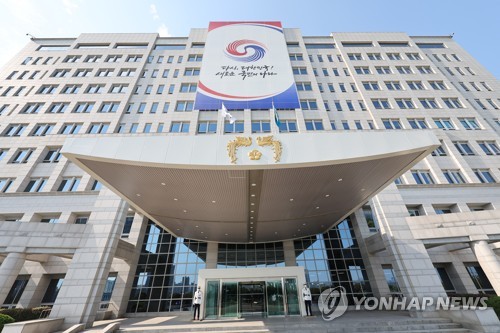 (LEAD) Presidential office denies Moon aides under consideration for PM, chief of staff
(LEAD) Presidential office denies Moon aides under consideration for PM, chief of staff
-
 Hybe says spinoff attempt by subsidiary label revealed clearly
Hybe says spinoff attempt by subsidiary label revealed clearly -
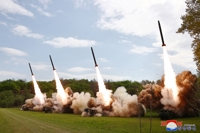 (LEAD) N. Korea says Kim guided simulated nuclear counterattack drill
(LEAD) N. Korea says Kim guided simulated nuclear counterattack drill -
 Hybe launches audit into NewJeans' label ADOR over alleged independence move
Hybe launches audit into NewJeans' label ADOR over alleged independence move -
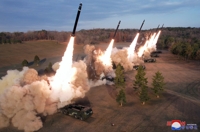 N. Korea says Kim guided simulated nuclear counterattack drills for 1st time
N. Korea says Kim guided simulated nuclear counterattack drills for 1st time -
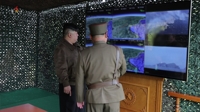 S. Korea warns N. Korea will face end of regime if it uses nuclear weapons
S. Korea warns N. Korea will face end of regime if it uses nuclear weapons















